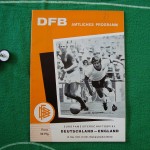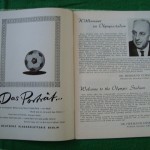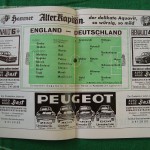UEFA European Championship Second Qualifying Phase/Quarter-Final 2nd Leg
Olympastadion, Berlin, 13.05.1972
![]()
0-0 (0-0)
– / –
Germany: Maier – Höttges, Breitner – Beckenbauer (c), Schwarzenbeck, Wimmer – Flohe, Netzer, U. Hoeneß (70. Heynckes), G. Müller, Held
England: Banks – Madeley, McFarland, Moore (c), Hughes – Storey, Ball, Bell, Hunter (71. Peters) – Chivers, Marsh (58. Summerbee)
Colours: Germany – white shirts, black shorts, black socks; England – red shirts, white shorts, red socks
Referee: Milivoje Gugulović (Yugoslavia)
Assistants: Josip Horvat, Petar Kostovski (Yugoslavia)
Yellow Cards: – / –
Red Cards: – / –
Attendance: 76,122
Match Programme Details
The match programme for the second leg of the European Championship play-off in Berlin differs markedly from its English equivalent; while the English programme has a number of colour photographs, the DFB publication is in simple black and white print. Its simplicity however is made up by the fact that there is double the content, with thirty-eight printed pages as opposed to nineteen. Priced at fifty Pfennig, the cover features Der Bomber Gerd Müller on the ball with England skipper Bobby Moore looking on.
After a series of introductions in both German and English by DFB President Dr. Hermann Gösmann, Berlin’s mayor Klaus Schütz and Berlin football supremo Eberhard Hartlep, there are the usual features on past matches as well as information on both sets of players.



Aspect: Portrait
Dimensions: 210 x 148 mm (A5)
Numbered Pages: 38
Language(s): German, welcome text in English
Match Report
If the game at Wembley had served to highlight the ever-growing gulf in technique and ability between the two sides, the return leg illustrated nothing more than the level to which English football had sunk.
Both teams came in to the match with highly contrasting approaches. While Helmut Schön retained what was essentially the same eleven as had lined up in the first leg – the only change being winger Heinz Flohe coming in as a straight replacement for the injured Jürgen Grabowski – Alf Ramsey named a far more defensive formation. Derby County’s Roy McFarland came in to stiffen up the defence, with hard man Norman Hunter being moved into a rejigged defensive midfield alongside fellow chopper Peter Storey who came in at the expense of Frannie Lee. Up front, Rodney Marsh came in for Geoff Hurst.
From the make-up of the side it was fairly clear that Ramsey had given up on trying to win the tie – unless the plan was to have Hunter and the thuggish Storey reduce the opposition to lacerated wrecks. Clearly of the opinion that his side had no chance of overturning the 3-1 deficit, the England coach instead directed his charges to use whatever means necessary to engineer a respectable result. What this really meant was a campaign to stifle Germany’s creativity – and quite literally kick Günter Netzer out of the game for not much more than the sheer hell of it. It was not pleasant and it was far from pretty to watch; indeed, it was tantamount to a betrayal of all that was great and good about the English game.
Not surprisingly, there is little one can say about the game itself. With England adopting such negative tactics Germany found themselves ambling through the ninety minutes – that is of course when they weren’t getting chopped down from all angles.
The first half saw Martin Chivers have a header cleared off the line by Horst-Dieter Höttges and Colin Bell balloon a header high over the bar, while at the other end Netzer had tried to beat Banks from all of forty yards and a charge by Siggi Held through the midfield ended with a shot that grazed the top of the opposition crossbar. With just over half an hour gone the impressive Uli Hoeneß tested Banks with a firm low shot after creating a decent shooting opportunity, but the England ‘keeper managed to parry the ball before Müller was called for offside in chasing the rebound.
The half came to a close with a flurry of silly fouls, as Höttges was scythed down by Norman Hunter and Netzer was upended by McFarland; the last action saw Siggi Held scuff a shot wide of the target – which pretty much summed things up.
The second half was even less exciting that the first, with teams going through the motions as the game headed towards a goalless draw – which in hindsight was inevitable. On more than one occasion the home side attempted to up the tempo: with some fifty-six minutes on the clock the twenty-year old Paul Breitner made a concerted charge down the left flank, playing a neat one-two with Gerd Müller before lashing the ball over the bar from a tight angle.
With some twenty minutes to go Hoeneß was replaced by Jupp Heynckes, who immediately attempted to pick up the pace. He was immediately in the thick of the action, being clattered by the ubiquitous Hunter. In what was a somewhat comedic moment Hunter scuttled off the field before the referee could show him the yellow card, his replacement Martin Peters announcing his arrival to the the official just as he was putting the card back in his pocket.
Germany should have taken the lead on seventy-eight minutes, but on this occasion it was not their poor finishing to blame but the raised flag of the linesman. Heynckes – who had taken over where the impressive Uli Hoeneß had left off – played a superb defence-splitting pass to Müller, who found himself in open space with only Gordon Banks to beat, only to be called back for offside. Having analysed the footage with freeze-frame technology, Müller was clearly onside, and at the very least level with the last defender. Not that this would have made a jot of difference to the overall result of the two-legged tie.
The second half ended much like the first, with a flurry of mindless tackles from the men in red. First Heynckes was brought down just outside the box – Netzer blazed the resulting free-kick over the bar – and skipper Franz Beckenbauer was was sent sprawling. It was pretty clear that this was the only thing Alf Ramsey’s side had left to give: it was almost a foul a minute as Netzer, Flohe and Wimmer all found themselves at the end of a sprawling or mistimed challenge, and an incensed Helmut Schön twice made his way onto the field. England’s tactics in the closing minutes were not lost on the Berlin crowd, who booed and jeered their every touch of the ball – “England ist k.o.” was the universal refrain.
The final moments saw Held scuff a shot into the arms of Banks, and when the final whistle blew there was a sense of relief across the ground. Among the most relieved would have been the German Nationaltrainer, who would have been happy to see his key players make their way off the field in one piece.
While the Germans themselves were restrained and even muted in their reaction to the evening’s events, the English press once again let their team know just what they thought of them. Helmut Schön and his side had more important things to worry about of course, such as the four-team final competition scheduled for the following month in Belgium.
The two-legged encounter in 1972 between England and Germany would signal a major fork in fortunes of the two sides: while Germany would go on to become European Champions and then World Champions two years later on home soil, England would not qualify for the finals of a major tournament for the best part of a decade.
Cumulative Record
Home: played 9, won 1, drawn 3, lost 5. Goals for 11, goals against 23.
Away: played 6, won 1, drawn 0, lost 5. Goals for 6, goals against 21.
Neutral: played 1, won 1, drawn 0, lost 0. Goals for 3, goals against 2.
Overall: played 16, won 3, drawn 3, lost 10. Goals for 20, goals against 46.
Competitive: played 4, won 2, drawn 1, lost 1. Goals for 8, goals against 7.
